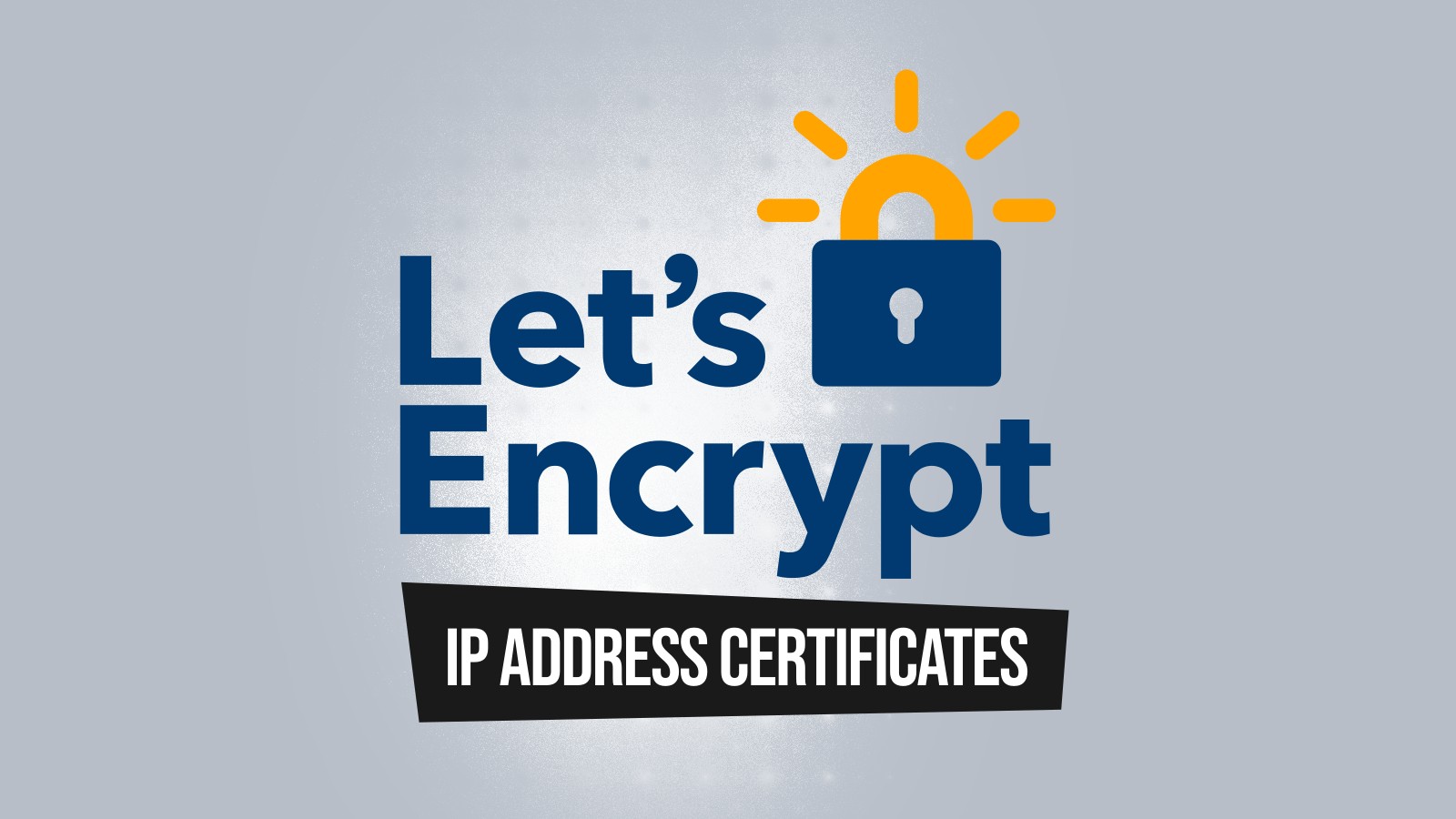Who benefits from this? Even though Let’s Encrypt stresses that most site operators will do fine sticking with ordinary domain certificates, there are still scenarios where a numeric identifier is the only practical choice:
Infrastructure services such as DNS-over-HTTPS (DoH) – where clients may pin a literal IP address for performance or censorship-evasion reasons.
IoT and home-lab devices – think network-attached storage boxes, for example, living behind static WAN addresses.
Ephemeral cloud workloads – short-lived back-end servers that spin up with public IPs faster than DNS records can propagate.
Can I get a cert for 127.0.0.1 ? /s
How many bits is a /s mask?
i
Is that the same
ias the squareroot of -1?
8
The down votes are from people who work in IT support that have to deal with idiots that play with things they dont understand.
It’s unfortunate they don’t know what /s means
It obviously means “secure”
We do, it’s just that those users will also often go “nah, I’m just joking!” then do some shit anyways.
How do I setup a reverse proxy for pure TCP? /s
Think that’s called NATing
It’s called buying more static IPs and making your ISP deal with it haha
You can based on the port.
nah, I was once an idiot who didn’t understand so idgaf
Yeah, the unfortunate part about internet security is that everyone has to start somewhere. And that means there’s always a newbie making dumb mistakes that they don’t even realize are dumb. It’s not a personal failing, unless they fail to learn from it.
If you can get their servers to connect to that IP under your control, you’ve earned it
Nothing a ski mask and a little mission impossible can’t fix :)
Is /s more or less IPs than /24? I need lots of IPs in case I want to expand
This would actually be useful for local testing of software during development.
That’s kind of awesome! I have a bunch of home lab stuff, but have been putting off buying a domain (I was a broke college student when I started my lab and half the point was avoiding recurring costs- plus I already run the DNS, as far as the WAN is concerned, I have whatever domain I want). My loose plan was to stand up a certificate authority and push the root public key out with active directory, but being able to certify things against Let’s Encrypt might make things significantly easier.
FYI you can get a numeric xyz domain for 1$ a year
At least for the first year.
Pretty sure it remains $1. But it’s specifically only 6-9 digit numeric .xyz domains.
nice
Setting up a root and a immediate CA is significantly more fun though ;) It’s also teaches you more about PKI which is a good skill to have.
but for the love of god and your own benefit, put a name constraint directly on the root cert
I use a domain, but for homelab I eventually switched to my own internal CA.
Instead of having to do
service.domain.tldit’s nice to doservice.lan.Any good instructions you would recommend for doing this?
use the official home.arpa as specified in RFC 8375
No thanks. I get some people agreed to this, but I’m going to continue to use
.lan, like so many others. If they ever register.lanfor public use, there will be a lot of people pissed off.IMO, the only reason not to assign a top-level domain in the RFC is so that some company can make money on it. The authors were from Cisco and Nominum, a DNS company purchased by Akamai, but that doesnt appear to be the reason why.
.homeand.homenetwere proposed, but this is from the mailing list:- we cannot be sure that using .home is consistent with the existing (ab)use
- ICANN is in receipt of about a dozen applications for “.home”, and some of those applicants no doubt have deeper pockets than the IETF does should they decide to litigate
https://mailarchive.ietf.org/arch/msg/homenet/PWl6CANKKAeeMs1kgBP5YPtiCWg/
So, corporate fear.
But
home.arpa’s top-level domain is.arpa?I’m not sure I follow the question. All of the TLD
*.arpais not reserved for private use, only*.home.arpa. So all your internal services are required to be a sub domain.Sounds like you followed.
Now that I’m moving goalposts, why not use
.home.arpasubdomains?
I just use openssl"s built in management. I have scripts that set it up and generate a
.landomain, and instructions for adding it to clients. I could make a repo and writeup if you would like?As the other commenter pointed out,
.lanis not officially sanctioned for local use, but it is not used publicly and is a common choice. However you could use whatever you want.
F I N A L L Y
Now tell me it supports IPv6 and I’ll be the happiest man alive
Maybe I’m not understanding it but I can’t see what I would use this for due to the 6 day issue period. Bringing a NAS up to copy data for a couple days is the only real use case I find for home users.
Because even if you pay for a static external IP from your ISP, this doesn’t support using such for longer than that period right?
Let’s Encrypt is meant yo be used with automated certificate renewal using the ACME protocol. There are many clients for this. Both standalone and built into e.g. Caddy, Traefik and other software that does SSL termination.
So this specific concern doesn’t really make sense. But that doesn’t mean I really see a use case for it either, since it usually makes more sense to access resources via a host name.
Thanks! I’ll look into that, this could be useful for me then after all. This is why it’s always good to ask questions
Can’t it automatically be renewed?
Not sure, I just saw the 6 day thing in the article, that would be nice though
Edit: vorpal says you should be able to using ACME https://programming.dev/comment/17987211
Yay!
Yay!
Its like self signed certs with the convience of a third party
Maybe kinda, but it’s also a third party whose certificates are almost if not entirely universally trusted. Self-signed certs cause software to complain unless you also spread a root certificate to be trusted to any machine that might use one of your self-signed certs.
This could go a long way towards fighting online censorship. One less issue when an authoritarian overreach gets your domain seized. Pretty awesome.
Would this work with a public dynamic DNS?
With dynamic DNS? Yeah it always has, as long as you can host a http server.
With a dynamic IP? It should do, the certs are only valid for 6 days for that reason.
Hell yuh.
I never understood why we don’t use IP certificates to encrypt the domain with SNI.
What do you mean?
In much simpler terms:
Think of an IP address like a street address. 192 My Street.
There might be multiple businesses at one street address. In real life we address them with things like 1/192 My Street and 2/192 My Street, but there’s no direct parallel to that in computer networks. Instead, what we do is more like directing your letter to say “Business A c/o 192 My Street”. That’s what SNI does.
Because we have to write all of that on the outside of the envelope, everyone gets to see that we’re communicating with Business A. But what if one of the businesses at 192 My Street is highly sensitive and we’d rather people didn’t know we were communicating with them? @bjoern_tantau@swg-empire.de’s proposal is basically like if you put the “Business A” part inside the envelope, so the mailman (and anyone who sees the letter on the way) only see that it’s going to 192 My Street. Then the front room at that address could open the envelope and see that the ultimate destination is Business A, and pass it along to them.
There’s Encrypted Client Hello, supported by major browsers that does the SNI encryption. It’s starting to be fairly widely supported.
192 My Street
Except that with street addresses there is such a lack of inconsistency on how they work and are written that it is funny
Currently before establishing an encrypted connection to a webserver the domain is sent to the webserver unencrypted so that the server can choose the appropriate certificate to use for encryption. That is called SNI, Server Name Indication.
Of course that’s a privacy risk. There are finally protocols to fix this but they aren’t very widespread and depend on DNS over HTTPS.
I think issuing certificates based on the IP and sending the domain name encrypted based on that certificate could have fixed this issue ages ago.
I would read layman discussions about why this (by context?) is good.
Domains need to be registered annually and DNS servers are needed to route traffic to them. But using an IP directly, you don’t need to worry about domain registration issues that can brick your systems, and you don’t have to worry about DNS providers knowing about your traffic (or maintaining your own private dns).
If it’s not a user trying in a memorable domain, an IP serves much better.
Couldn’t this prove very troublesome in combination with carrier grade nat?
I don’t see how? Normal HTTP/TLS validation would still apply so you’d need port forwarding. You can’t host anything on the CGNAT IP so you can’t pass validation and they won’t issue you a cert.
You can totally host something on carrier-grade NAT using techniques like NAT hole punching.
You don’t get control of the incoming port that way. For LetsEncrypt to issue a certificate primarily intended for HTTPS, they will check that the HTTP server on that IP is owned by the requesting party. That has to live on port 80, which you can’t forward on CGNAT.
They will require the requester to prove they control the standard http(s) ports, which isn’t possible with any nat.
It won’t work for such users, but also wouldn’t enable any sort of false claims over a shared IP.














